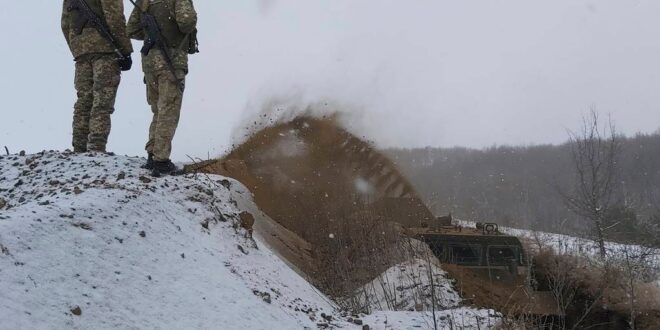Russian and U.S. negotiators will sit down for talks early next year to discuss Moscow’s demand for Western guarantees precluding NATO’s expansion to Ukraine, Russia’s top diplomat said Wednesday.
Foreign Minister Sergey Lavrov said that Russia in January will also start separate talks with NATO to discuss the issue, adding that separate negotiations under the auspices of the Organization for Security and Cooperation in Europe will also be held.
Last week, Moscow submitted draft security documents demanding that NATO deny membership to Ukraine and other former Soviet countries and roll back the alliance’s military deployments in Central and Eastern Europe. Washington and its allies have refused to provide such pledges, but said they are ready for the talks.
Moscow presented the demands amid soaring tensions over a Russian troop buildup near Ukraine that has stoked fears of a possible invasion. U.S. President Joe Biden warned Russian President Vladimir Putin in a conference call earlier this month that Russia will face “severe consequences” if it attacks Ukraine.
Putin has denied having plans to launch an attack but has described NATO’s expansion to Ukraine and weapons deployment of the alliance weapons there as a “red line.”
“We don’t want a war,” Lavrov said Wednesday. “We don’t want to take the path of confrontation. But we will firmly ensure our security using the means we consider necessary.”
Speaking in a live interview with Russian RT television, Lavrov hailed Washington’s “business-like” approach that helped quickly agree on parameters of the future talks.
He added that Moscow would be ready to consider Washington’s demands, but warned that the talks mustn’t drag out indefinitely.
“I hope that they will take us seriously given the moves we take to ensure our defense capability,” he said.
Kremlin spokesman Dmitry Peskov also hailed reaching a quick agreement on the start of the talks, but noted that they should be “aimed at reaching concrete results and not become drawn out.” He added that Moscow expects Washington to present a detailed platform for the talks and be ready for a constructive discussion.
“We want these talks,” he said in a conference call with reporters. “And, certainly, the talks are held to discuss each other’s positions.”
A key principle of the NATO alliance is that membership is open to any qualifying country, and the U.S. has said it won’t give Russia the kind of guarantee on Ukraine it seeks. In the meantime, the American side is conferring with its European allies.
U.S. Secretary of State Antony Blinken discussed Ukraine on Wednesday with Josep Borrell, the EU’s high representative for foreign affairs and security policy.
“They emphasized the need for coordinated action to support Ukraine’s sovereignty and territorial integrity and reaffirmed that any further Russian military aggression against Ukraine would have massive consequences for the Russian Federation,” State Department spokesman Ned Price said.
Separately, U.S. Army Col. Dave Butler, spokesman for the Joint Chiefs of Staff, said that Gen. Mark Milley, chairman of the Joint Chiefs, spoke Tuesday with Russian Gen. Valery Gerasimov, chief of the Russian General Staff. He said the generals discussed regional security issues, but no details of the conversation were released.
Russia annexed Ukraine’s Crimean Peninsula in 2014 and shortly after cast its support behind a separatist rebellion in the country’s east. The fighting, which started more than seven years ago, has killed over 14,000 people and devastated Ukraine’s industrial heartland, known as the Donbas.
Ukraine’s security chief said Wednesday that the country now faces more than 250,000 troops amassed in western Russia.
 Eurasia Press & News
Eurasia Press & News




